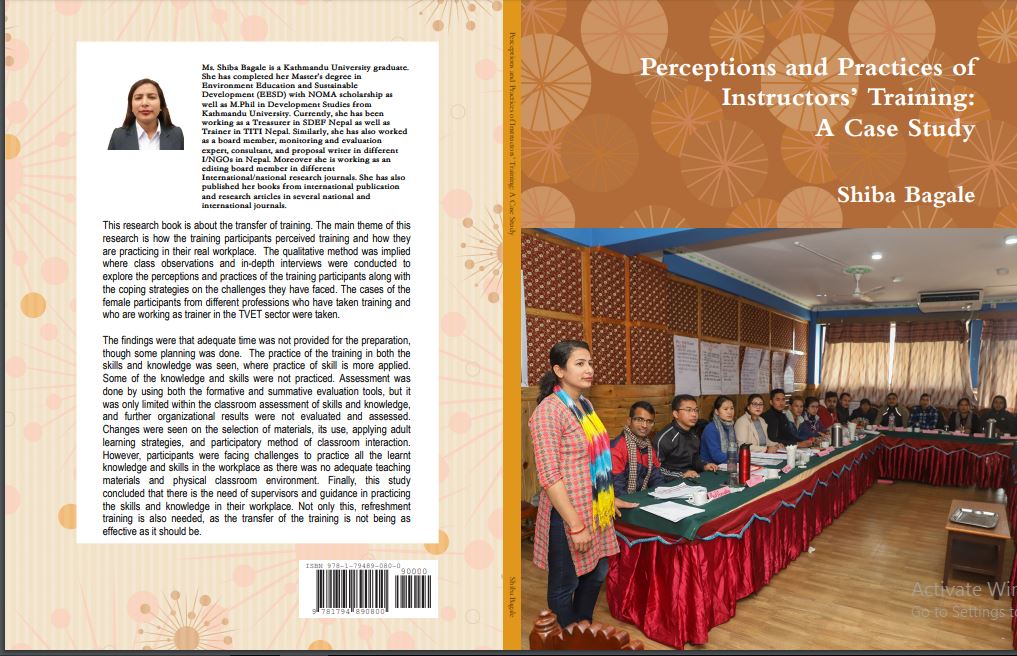Perception and Practices of Instructors’ Training
REVIEWS, 3 Feb 2020
Shree Prasad Devkota – TRANSCEND Media Service
Perception and Practices of Instructors’ Training: A Case Study by Shiba Bagale, Cook Communication, 30 January, 2020, USA, 136 pp.
Cook Communication, a renowned name in the field of publication from United States of America has published a research book of a Nepali writer, entitled “Perceptions and Practices of Instructors’ Training: A Case Study on January 20, 2020. The research book is about the instructor’s perception about the training that they have participated and practices after the training. Shiba Bagale, the author of the book, has tried to incorporate the instructor’s essence on the trainings and the application of the training in the real field. The book has tried to explore the instructors’ opinion and the learning from the training. Likewise, planning, preparation, assessment and coping strategies about the training are highlighted.
The book has tried to grasp the real scenario on the participant’s views about the training and the relevancy of the trainings practice in the real workplace. The four female participants who were the participants of the training and are providing training are taken. In depth, interviews and class observations were carried out and the information from the interviews and class observations were analyzed to explore the themes. Then the analyzed themes were interpreted to draw conclusions with policies and theories. Credibility was maintained through prolonged engagement in the field, thick description of the study context and sharing findings with the participants. To ensure the ethics, participants were fully assured for do no-harm, and pseudonyms were used.
The findings show that all the participants did planning for the preparation of the visuals and teaching learning materials. The planning has helped them to manage time, to make clear understanding on the topic and make it easy to deliver the classroom with the use of different approaches as per the plan. The practice of the training in both the skills and knowledge were seen, where skills practice is more applied. Some of the knowledge and skills are not practiced too. Likewise, the assessment has been done by using both the formative and summative evaluation tools. However, it was only limited within the classroom assessment of skills and knowledge, and further organizational results were not evaluated and assessed.
Likewise, the participants have felt changes in their practice and teaching learning approaches. This has positive effect on both the trainers and trainees as the achievement has been increased. In addition, the changes are seen on the selection of materials, its use, applying adult learning strategies, participatory method of classroom interaction. However, they are facing challenges to practice all the learnt knowledge and skills in the workplace, as there are no adequate teaching materials and physical classroom environment. With the lack of the necessary materials and environment, they are practicing the skills with sharing the materials and dividing the groups, making turns to practice which seems that they are coping with the situation in their workplace.
Finally, this book concluded that there is the need of the supervisors and guide in practicing the skills and knowledge in their workplace. In addition, the necessity of adequate materials and environment is seen as the need of the participants. Not only this, the refreshment training is also needed, as the transfer of the training is not being as effective as it should be.
______________________________________________
 Shree Prasad Devkota is a member of the TRANSCEND Network for Peace, Development and Environment. He is a Kathmandu University graduate, has a Master’s in Mathematics Education and M.phl in Development Studies. Currently he is chairperson of SDEF–Sustainable Development and Empowerment Forum, and has worked as a lecturer. He is researcher in the field development sectors in Nepal and has worked as consultant, monitoring and evaluation expert in different I/NGOs. Devkota has been working in the field of education of children, marginalized and socially excluded groups, especially on conflict management regarding the post-conflict situation in Nepal. He has published several research articles in national and international journals. Books: Teacher’s Lived Experiences and Contextualized Mathematics, LAP Lambert Academic Publishing, Germany, 2012. Education in Nepal from Dalit Perspective, LAP Lambert Academic Publishing, Germany, 2013. Conflict in School and Its Management, with Shiba Bagale, Scholars’ Press, Germany, 2015. Life and Education of Children in Nepal (Pre and Post Peace Agreement a Comparative Study) Adroit Publishers , India,2017.
Shree Prasad Devkota is a member of the TRANSCEND Network for Peace, Development and Environment. He is a Kathmandu University graduate, has a Master’s in Mathematics Education and M.phl in Development Studies. Currently he is chairperson of SDEF–Sustainable Development and Empowerment Forum, and has worked as a lecturer. He is researcher in the field development sectors in Nepal and has worked as consultant, monitoring and evaluation expert in different I/NGOs. Devkota has been working in the field of education of children, marginalized and socially excluded groups, especially on conflict management regarding the post-conflict situation in Nepal. He has published several research articles in national and international journals. Books: Teacher’s Lived Experiences and Contextualized Mathematics, LAP Lambert Academic Publishing, Germany, 2012. Education in Nepal from Dalit Perspective, LAP Lambert Academic Publishing, Germany, 2013. Conflict in School and Its Management, with Shiba Bagale, Scholars’ Press, Germany, 2015. Life and Education of Children in Nepal (Pre and Post Peace Agreement a Comparative Study) Adroit Publishers , India,2017.
Ms. Shiba Bagale is a Kathmandu University graduate. She has completed her Master’s degree in Environment Education and Sustainable Development (EESD) with NOMA scholarship as well as M.Phil scholar in Development Studies. Currently, she is a PhD scholar on Gender from Tribhuvan University. She has been working as a treasurer in SDEF Nepal as well as Trainer in TITI Nepal. Similarly, she has also worked as a board member, monitoring and evaluation expert, consultant, and proposal writer in different NGOs in Nepal. She has published her books from international publication and research articles in several national and international journals.
Tags: Reviews
This article originally appeared on Transcend Media Service (TMS) on 3 Feb 2020.
Anticopyright: Editorials and articles originated on TMS may be freely reprinted, disseminated, translated and used as background material, provided an acknowledgement and link to the source, TMS: Perception and Practices of Instructors’ Training, is included. Thank you.
If you enjoyed this article, please donate to TMS to join the growing list of TMS Supporters.

This work is licensed under a CC BY-NC 4.0 License.
